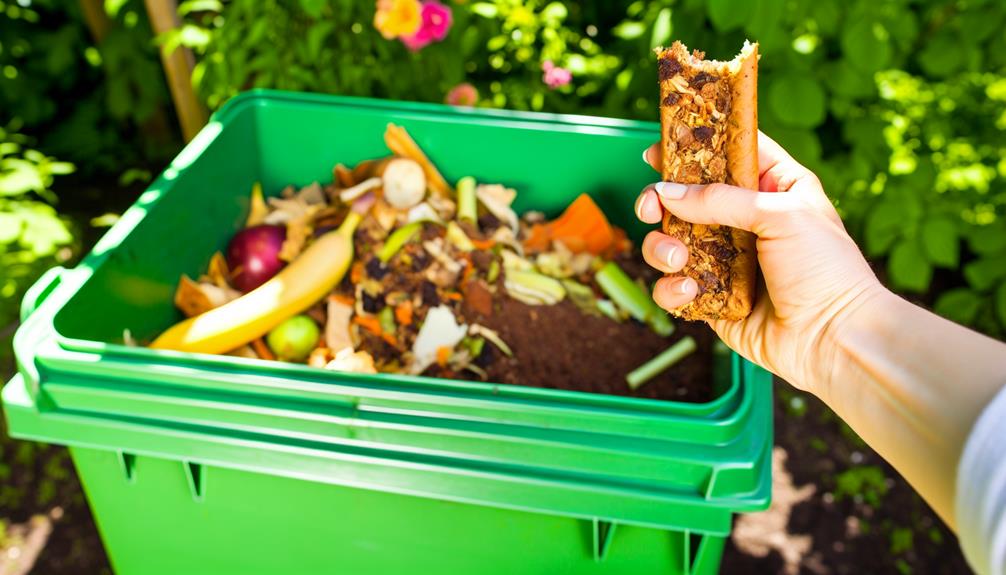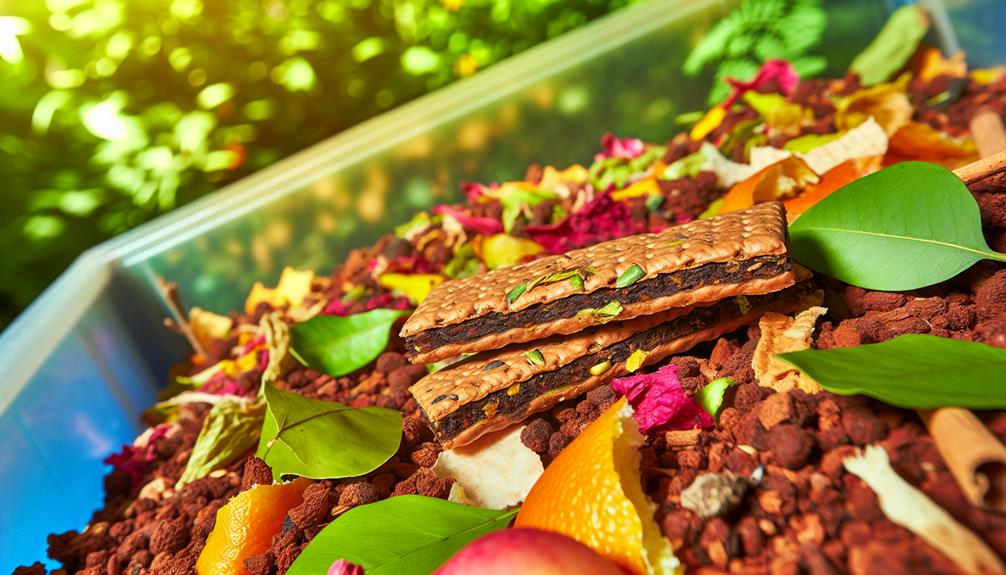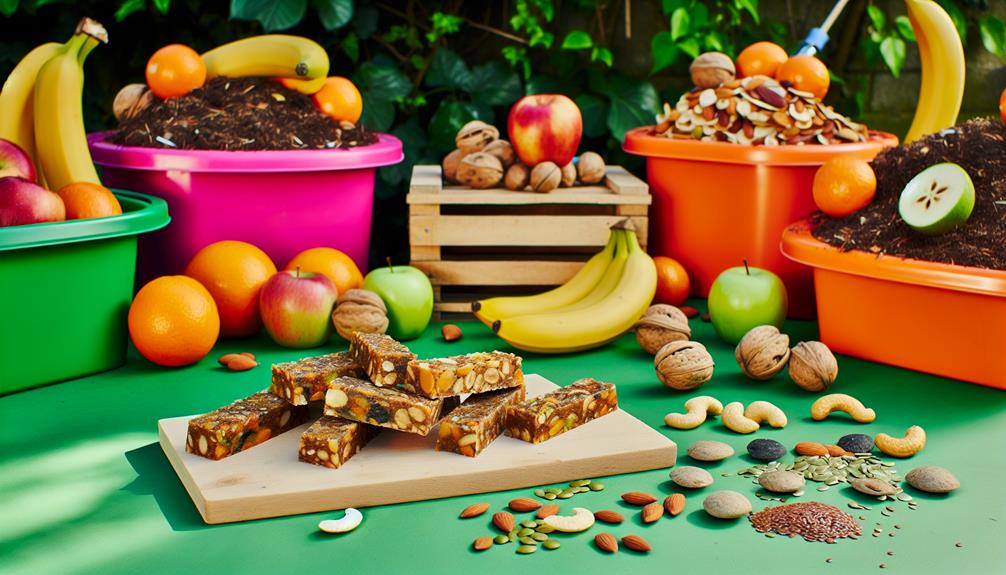

You can compost parts of snack bars, like nuts, dried fruits, and grains, as these break down into nutrient-rich compost. However, watch out for non-organic additives and the packaging. Most snack bar wrappers are plastic and not compostable, so they should be disposed of appropriately. Look for biodegradable or compostable packaging if available.
Regularly turn your compost pile and maintain moisture levels for efficient decomposition. If you choose eco-friendly brands, they often use sustainable and compostable materials. Understanding how to manage both the organic and inorganic components of snack bars will help you compost effectively.
Snack bars typically consist of a variety of ingredients, including nuts, dried fruits, grains, sweeteners, and sometimes chocolate or seeds. These components each contribute to the snack bar’s nutrient content and flavor variety, making them a popular choice for a quick energy boost.
Let’s break down the main ingredients commonly found in snack bars:
| Component | Nutrient Content | Flavor Variety |
|---|---|---|
| Nuts | Protein, healthy fats | Crunchy, savory |
| Dried Fruits | Fiber, natural sugars | Sweet, chewy |
| Grains | Carbohydrates, fiber | Nutty, satisfying |
| Sweeteners | Glucose, fructose | Sweet, indulgent |
| Chocolate | Antioxidants, theobromine | Rich, decadent |
When you look at the table, you’ll see how each ingredient not only adds to the nutritional profile but also to the taste and texture. Nuts like almonds or cashews provide crunch and healthy fats. Dried fruits such as raisins or apricots bring natural sweetness and chewiness. Grains, including oats or quinoa, offer a solid base rich in fiber and carbs.
Sweeteners, whether honey or agave, enhance the overall sweetness, while chocolate or seeds like chia add unique flavors and textures. Understanding these components helps you appreciate the balance between nutrition and taste in your favorite snack bars.
Also Read: Can You Compost Cat Manure?
Composting organic ingredients from your snack bars is an excellent way to reduce waste and enrich your garden soil. When you finish a snack bar, don’t just toss the food scraps into the trash. Instead, add them to your compost pile. Organic waste like nut fragments, dried fruits, and grains from your snack bars can break down and turn into nutrient-rich compost.

To get started, gather all your food scraps and place them in a compost bin or pile. Make sure you mix these ingredients with other compostable materials like vegetable peels, coffee grounds, and yard waste. This helps maintain the right balance of green and brown materials, which is essential for efficient decomposition.
Be sure to turn your compost regularly to aerate it, promoting faster breakdown of organic waste. Monitoring the moisture level is also important. Your compost should be damp but not soaking wet. If it’s too dry, add water or more green materials. If it’s too wet, mix in more brown materials like dry leaves or cardboard.
With consistent care, your compost will transform into a valuable resource for your garden, boosting plant health and reducing landfill waste.
When considering snack bar packaging, you’ll encounter both plastic wrappers and biodegradable options.
Plastic wrappers pose a significant challenge for composting due to their non-biodegradable nature.
In contrast, biodegradable packaging offers an eco-friendly alternative that can break down naturally.
Many snack bars come wrapped in plastic, posing a significant challenge for composting efforts. These plastic wrappers contribute to recycling challenges because they often consist of mixed materials that are hard to separate and process. Consequently, they end up in landfills, adding to plastic pollution and harming the environment.
When you’re trying to live sustainably, this becomes frustrating. You want to do the right thing, but the packaging makes it difficult. One thing you can do is check the type of plastic. Some wrappers might’ve recycling symbols, indicating they can be recycled under specific conditions.
However, even when recycling is an option, it’s not always straightforward. Local recycling programs vary, and many don’t accept these materials due to their composite nature.
Consider collecting these wrappers and taking them to specialized recycling centers. Programs like TerraCycle accept snack bar wrappers and help reduce plastic waste.
Another approach is to minimize purchasing snack bars with plastic packaging altogether. Opt for brands that use more eco-friendly materials or make your own snack bars at home, storing them in reusable containers. By making these small changes, you can contribute to reducing plastic pollution and support a more sustainable lifestyle.
Exploring biodegradable packaging options can greatly reduce the environmental impact of your snack bar consumption. When you choose products with plant-based packaging, you support a sustainable lifestyle that benefits both you and the planet. Plant-based packaging is made from renewable resources like cornstarch, sugarcane, and even seaweed, offering an eco-friendly alternative to traditional plastic wrappers.
You might also find snack bars wrapped in materials designed to be composted at home. These compostable packages break down naturally, reducing landfill waste and contributing to healthier soil. When you discard these wrappers, pair them with compostable utensils to maintain consistency in your eco-friendly practices.
To make sure you’re making the best choices, check for certification labels on the packaging that indicate compostability. Brands are increasingly transparent about their materials, making it easier for you to align your purchases with your values.
Also Read: Can You Compost Celery?
When considering the compostability of snack bar wrappers, you should pay attention to the materials they’re made from, as this affects their ability to break down.
Compostable wrappers, often made from plant-based materials, decompose faster than traditional plastic ones.
Keep an eye on the decomposition time frame to make sure your compost pile stays healthy and efficient.
In the world of snack bars, the compostability of wrappers hinges on the materials used. When you add wrappers to your compost pile, it’s important to know if they’re made from biodegradable materials.
Wrappers made from natural fibers, like paper or plant-based plastics, are more likely to break down through aerobic decomposition. This process involves microorganisms that thrive in oxygen-rich environments, helping to turn organic waste into rich compost.
However, many snack bar wrappers today are made from mixed materials or coated with plastic, which aren’t compostable. These materials can contaminate your compost pile and slow down the decomposition process.
To avoid this, always check the packaging for compostability labels. Look for terms like ‘biodegradable’ or ‘compostable’ and make sure they meet recognized standards.
Understanding how long it takes for a snack bar wrapper to decompose is essential for effective composting. You want to make sure that what you’re adding to your compost bins will break down in a reasonable time frame and contribute positively to soil health.
Most snack bar wrappers aren’t compostable because they’re made from a mix of plastic and aluminum. These materials can take decades, if not centuries, to decompose, which isn’t ideal for your composting efforts.
If you’re committed to composting, look for snack bars with wrappers labeled as compostable. These wrappers are often made from plant-based materials that can break down in a few months to a year, depending on your composting conditions.
Keep your compost bins well-aerated and maintain a balanced mix of green (nitrogen-rich) and brown (carbon-rich) materials to speed up decomposition.
Choosing between biodegradable and non-biodegradable snack bar wrappers can have a substantial impact on the environment. Biodegradable wrappers break down naturally, reducing the landfill impact. When these wrappers decompose, they return to the earth, minimizing waste accumulation and the environmental footprint.
On the other hand, non-biodegradable wrappers, often made from plastics and other synthetic materials, linger in landfills for years, if not centuries. Recycling these non-biodegradable wrappers presents its own set of challenges. Many snack bar wrappers are composed of mixed materials, such as plastic and foil, making them difficult to recycle effectively.
Even when they’re recyclable, they often end up in the wrong waste stream due to consumer confusion or lack of proper facilities. This misplacement can contaminate recycling batches, leading to more waste. To make environmentally conscious choices, you should opt for snack bars with biodegradable packaging whenever possible.
Look for labels that specify compostability or biodegradability. By doing so, you contribute to reducing landfill waste and simplifying the recycling process. Your small actions can collectively make a significant difference, fostering a sense of community and shared responsibility for our planet.
Proper disposal of non-compostable materials guarantees they don’t harm the environment more than necessary. Start by practicing effective waste segregation. Separate non-compostable items like plastic wrappers, aluminum foil, and certain snack bar packaging from your compostable waste. This step is essential because mixing these materials can contaminate your compost and reduce its quality.
Recognize the recycling importance for non-compostable items. Many snack bar wrappers are made from recyclable materials. Check the packaging for recycling symbols and instructions. If your local recycling program accepts these items, place them in the appropriate bin. This action ensures they get processed correctly and reduces landfill waste.
Don’t forget about specialty recycling programs. Some companies and local organizations offer take-back programs for specific types of waste. Research and join these initiatives to contribute to a larger community effort.
Additionally, educate your household on proper waste segregation practices. When everyone participates, it creates a sense of belonging and shared responsibility.
By focusing on eco-friendly snack bar brands, you can make a significant impact on reducing waste and supporting sustainable practices. Choosing snack bars from sustainable brands not only benefits the environment but also aligns you with a community that values ethical sourcing and responsible production.
Start by looking for brands that prioritize sustainable ingredients. Many of these companies work directly with farmers to guarantee that their raw materials are ethically sourced. This means paying fair wages and using farming methods that don’t harm the environment. Brands like Clif Bar and KIND use organic ingredients and support fair trade practices, making sure that everyone in the supply chain is treated fairly.
Packaging is another critical aspect. Opt for brands that use compostable or recyclable packaging. For instance, companies like LÄRABAR and GoMacro have made strides in reducing plastic waste by using eco-friendly materials. This not only lessens your environmental footprint but also motivates these companies to continue their sustainable efforts.
Also Read: Can You Compost Black-Eyed Peas?
To snack sustainably, consider incorporating locally-sourced and seasonal ingredients into your choices. This practice not only supports local farmers but also reduces your carbon footprint.

When planning your snacks, it’s important to focus on portion control to avoid overeating and food waste. Smaller portions can help you maintain steady energy levels throughout the day.
Here are a few practical tips to enhance your sustainable snacking habits:
These steps not only help the environment but also foster a sense of community and belonging by supporting local economies. By making these mindful choices, you’ll contribute to a more sustainable future while keeping your energy levels balanced throughout the day.
Snack bars’ decomposition rate in a compost pile varies. If they’re organic, they might break down in a few months. However, wrappers and additives can slow the process. Join our eco-friendly community—let’s compost smarter together!
You shouldn’t compost snack bars with artificial ingredients. These additives can lead to compost contamination, affecting the quality and safety of your compost. Stick to natural, organic waste to keep your compost healthy and thriving.
When considering composting snack bars, be aware of the nutrient balance and contamination risk. You don’t want harmful chemicals or artificial ingredients affecting your compost. It’s important to keep your community garden safe and thriving.
Yes, snack bars can attract pests when composted. To guarantee pest prevention and rodent control, you should bury them deep in your compost pile and regularly turn it. Doing this helps keep your compost community clean and pest-free.
Yes, you can compost partially eaten snack bars. Just make sure you maintain nutrient balance by mixing with greens and browns and control moisture to avoid pests. You’ll create rich compost for your community garden!
To compost snack bars effectively, focus on separating organic ingredients from non-compostable packaging. Check if wrappers are biodegradable; if not, dispose of them properly.
Opt for eco-friendly brands with compostable packaging. Always follow local composting guidelines.
By making informed choices and managing waste responsibly, you’ll contribute to a more sustainable environment. Happy composting!
